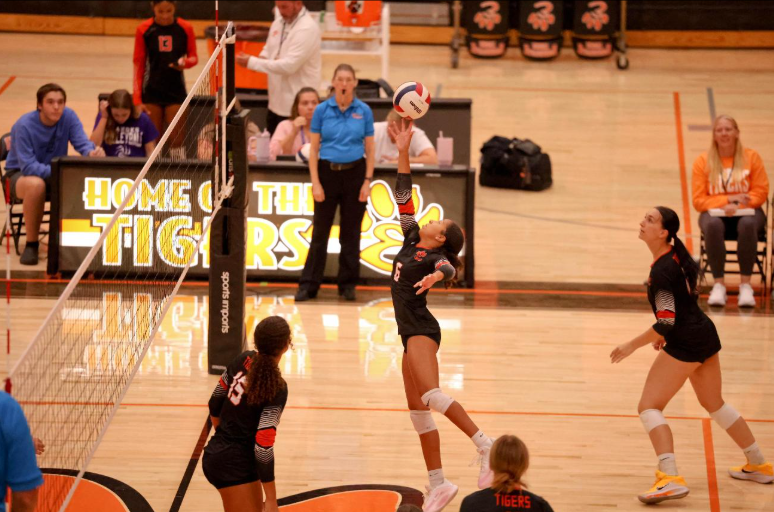AP-Class Guide
Austin Terry, Destiny Jones, Abigail Shelton and Hunter Cross work in an advanced placement chemistry class at Lawrence County High School Thursday, Jan. 30, 2014 in Moulton, Ala. The Lawrence County School system added the advanced placement classes this year after having to drop them in 2009 due to proration. (AP Photo/The Decatur Daily, Gary Cosby Jr.)
May 2, 2022
The end of the 2021-2022 school year is fast approaching. While seniors are likely scheduling orientations for college, freshmen, sophomores and juniors are choosing classes for yet another year at EHS.
For the students who picked to take AP classes, this new year will begin over the summer with preliminary work assigned to prepare them for the rigorous schedules ahead.
Whether reading the textbook and taking notes, watching videos or completing worksheets, AP students have plenty of material to cover over the summer.
Besides studying, however, aspiring AP students prepare for these courses by looking to those who have completed the courses for insight into what’s to be expected.
Many AP classes require similar amounts of work and dedication, but there are many distinctions between them.
AP Calculus AB
If any teacher could win an award for getting on their soapbox the most times in one year, Mollie Rice would win handedly.
She teaches AP Calculus AB and AP Calculus BC.
Calc AB covers the material of one semester of college calculus. With AP or dual credit, this course can cover the necessary math credits for some college majors.
Calc BC covers one year’s worth of college calculus material.
According to senior Adrian Norcio, Calc BC was easier than he thought in the first semester. In the second semester, however, the difficulty increased dramatically and became one of his harder AP classes.
And although Calc AB covers half of the material as Calc BC, it is no easy feat.
“I thought AP Calc would be pretty challenging, and it is,” senior Oliver Ferdinand said. “But because I have paid attention in class and done my homework, I have been pretty successful in it.”
And although it is not required, Ferdinand recommends doing all of the book work.
Whatever you do, listen to Ms. Rice and “Don’t let precalculus be the reason you can’t do calculus.”
AP Chemistry
AP Chemistry is one of four AP science courses offered at EHS. It is well-known for depriving students of livelihood and happiness, but the curves on tests usually take away the sting of failure.
“Chem I knew was going to be really hard,” junior Spencer Rawson said. “But I was prepared for it.”
This difficulty was primarily in tests, quizzes and labs. According to Rawson, the homework load was relatively small compared to other AP science classes.
But with little homework came only a small portion of homework points in the gradebook. Because of this, assessments become even more important.
“Watch the AP review videos that are online right before a quiz or test,” Rawson said.
AP Computer Science
According to the EHS course handbook, AP Computer Science A “covers basic programming topics such as input/output methodology, as well as decision, control, and iterating constructs using the Java language.”
The Java Language is one of several languages taught for AP Computer Science. For Ferdinand, this added to the difficulty of the class.
“AP CSP is a little harder than I expected because instead of focusing one one language and mastering it, you try a little bit of everything,” he said.
Ferdinand also recommends becoming familiar with Object Oriented Programming, as it is a significant part of the course.
“Other than that, just make sure to pay attention in class,” Ferdinand said.
AP Statistics
Norcio doubled-up on AP math courses by taking AP Computer Science and AP Statistics in the same year.
“During the first semester, Stats and Comp Sci was Hell,” Norcio said.
This class is taught by John Meinzen, who has been reported by many students to be an interesting guy with a lot of stories.
According to senior Grace McGinness, AP Statistics requires writing in addition to math which distinguishes it from other math courses.
While this course is rigorous, and the students may have to create bell-curves of their test averages, hard work will make the course more manageable.
“Read the book SEVERAL times! Laziness won’t get you far,” Norcio said.
AP Biology
Taught by a teacher who is the self-proclaimed Dragon Lady, Julia Doll, AP Biology is no easy beast to conquer.
The course combines science with writing as students learn about different biological processes, ending the year with dissection labs.
While Mrs. Dolls PowerPoint notes are colorful and full of pictures, supplementation with the textbook is vital for success in the course.
“Read your book and notes frequently to memorize and truly understand what is being taught,” Ferdinand said.
And while her nickname as the Dragon Lady may paint Mrs. Doll as being intimidating, asking questions that aren’t answered in the book is important to truly understand everything.
“Personally, I just made sure to evaluate what I did not know,” Ferdinand said. “And then I focused on clarifying the things that I did not know through the book or by asking the teacher directly.”












